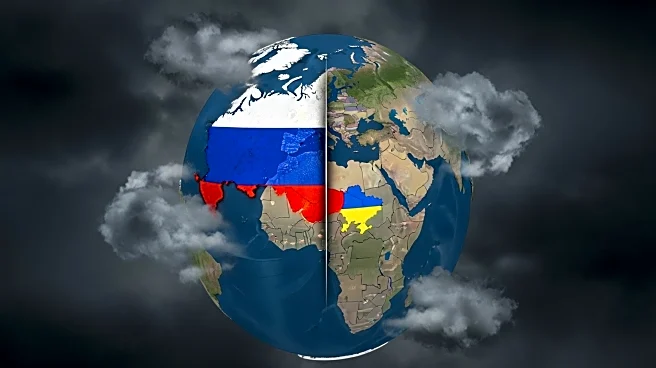What's Happening?
The ongoing conflict between Russia and Ukraine has expanded into an energy war, with both nations targeting each other's energy infrastructure. Russia has intensified attacks on Ukraine's electricity and gas facilities, aiming to weaken its economy and morale
as winter approaches. Meanwhile, President Trump has imposed new sanctions on Russian oil companies, Lukoil and Rosneft, to further pressure Russia economically. These sanctions are designed to disrupt Russia's energy exports, which are crucial to its economy, and potentially influence key buyers like India to reduce imports.
Why It's Important?
The energy war represents a strategic shift in the conflict, as both sides leverage energy assets to gain an advantage. The U.S. sanctions could significantly impact Russia's economy, which relies heavily on energy exports. By targeting major oil companies, the U.S. aims to cut off a vital source of revenue for Russia's military operations. This move could also affect global energy markets, as Russia is a major supplier. The conflict's escalation into the energy sector underscores the interconnectedness of military and economic strategies in modern warfare.
What's Next?
As winter approaches, the energy battle is expected to intensify, with Russia likely to continue targeting Ukraine's infrastructure. The U.S. will monitor the impact of the sanctions and may consider additional measures if Russia does not engage in peace negotiations. The international community may increase diplomatic efforts to resolve the conflict, while countries dependent on Russian energy may seek alternative sources. The situation remains fluid, with potential for further escalation or diplomatic breakthroughs.
Beyond the Headlines
The energy war highlights the broader implications of geopolitical conflicts on global energy security. The sanctions raise questions about the ethical use of economic measures in warfare and their impact on civilian populations. The conflict's expansion into the energy sector reflects the complex dynamics of modern warfare, where economic strategies play a crucial role alongside military actions. The long-term effects on global energy markets and international relations remain uncertain, as does the potential for a peaceful resolution.
















